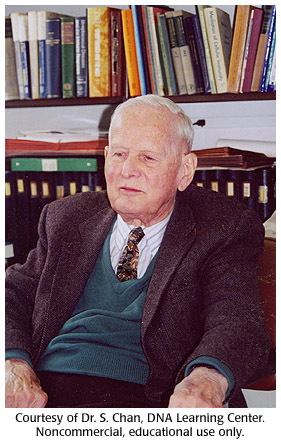Gallery 17: Maclyn McCarty, 1999

Maclyn McCarty in his office at Rockefeller University, 1999.
rockefeller university, maclyn mccarty
- ID: 16384
- Source: DNALC.DNAFTB
Related Content
16386. Video 17: Maclyn McCarty, clip 2
Relating how Avery was a successful orator while an undergraduate at Colgate University, and his subsequent disdain for public speaking as a scientist.
16385. Video 17: Maclyn McCarty, clip 1
Commenting on Avery as a scientific group leader and as a person.
16387. Video 17: Maclyn McCarty, clip 3
Describing the in vitro transformation experiments: the effect of removing polysaccharides from the bacterial extracts.
16388. Video 17: Maclyn McCarty, clip 4
Describing the in vitro transformation experiments: the effect of destroying nucleic acids.
16389. Video 17: Maclyn McCarty, clip 5
Characterizing the resistence to the discovery of DNA as the transforming factor: running against existing dogma.
16390. Video 17: Maclyn McCarty, clip 6
How the bacterial transformation experiments provided the first real opportunity to study the chemical nature of the gene.
16058. Maclyn McCarty
MACLYN MCCARTY (1911-)
16392. Biography 17: Maclyn McCarty (1911- 2005)
In 1944, Maclyn McCarty and his colleagues, Colin MacLeod and Oswald Avery published their landmark paper on the transforming ability of DNA.
16383. Gallery 17: Maclyn McCarty, 1936
Portrait of Maclyn McCarty in 1936.
16391. Biography 17: Oswald Theodore Avery (1877-1955)
In 1944, Oswald Avery and his colleagues, Colin MacLeod and Maclyn McCarty published their landmark paper on the transforming ability of DNA.












